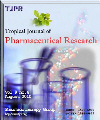
|
Tropical Journal of Pharmaceutical Research
Pharmacotherapy Group, Faculty of Pharmacy, University of Benin, Benin City, Nigeria
ISSN: 1596-5996
EISSN: 1596-5996
Vol. 11, No. 1, 2012, pp. 51-61
|
 Bioline Code: pr12007
Bioline Code: pr12007
Full paper language: English
Document type: Research Article
Document available free of charge
|
|
|
Tropical Journal of Pharmaceutical Research, Vol. 11, No. 1, 2012, pp. 51-61
| en |
Effect of Standardized Decoction of Nigella sativa  Seed, Hemidesmus indicus Seed, Hemidesmus indicus  Root and Smilax glabra Root and Smilax glabra  Rhizome on the Expression of p53 and p21 Genes in Human Hepatoma Cells (HepG2) and Mouse Liver with Chemically-Induced Hepatocarcinogenesis Rhizome on the Expression of p53 and p21 Genes in Human Hepatoma Cells (HepG2) and Mouse Liver with Chemically-Induced Hepatocarcinogenesis
Samarakoon, Sameera R; Thabrew, Ira; Galhena, Prasanna B & Tennekoon, Kamani H
Abstract
Purpose: To evaluate in vitro (using human hepatoma HepG2 cells) and in vivo (using mouse liver with diethlynitrosamine (DEN)-induced hepatocarcinogenesis) effect of a standardized decoction on the expression of p53 (tumour suppressor) and p21 (cyclin kinase inhibitor) genes with the long-term goal of developing the formulation into a globally acceptable therapy for hepatocellular carcinoma (HCC).
Methods: The effect of the decoction on (a) mRNA and (b) protein expression of p53 and p21 genes in HepG2 cells and mouse livers with DEN-induced early hepatocarcinogenesis were evaluated by (a) reverse transcription PCR (RT-PCR) and (b) immunohistochemical and Western blot analysis, respectively.
Results: The results demonstrated that the decoction significantly (p <0.001) enhanced the expression of p53 and p21 genes in a time- and dose-dependent manner in HepG2 cells. A dose of 75 μg/ml significantly increased p53 mRNA at 24 and 48 h and p21 mRNA at 12, 24, 48 h of incubation with the decoction (p <0.01). Induction of hepatocarcinogenesis in mice significantly increased hepatic expression of both p53 and p21 compared to distilled water control (p <0.001), while treatment with the decoction further enhanced expression of both genes in DEN-induced hepatocarcinogenesis (p <0.01).
Conclusion: Overall, the findings demonstrate that the decoction may mediate its reported antihepatocarcinogenic effect, at least in part, through the modulating activities of genes involved in tumour suppression and cell cycle arrest.
Keywords
Hemidesmus indicus, Nigella sativa, Smilax glabra, HepG2 cells, Diethylnitrosamine, p53, p21.
|
| |
© Copyright - 2012 Tropical Journal of Pharmaceutical Research
Alternative site location: http://www.tjpr.org
|
|
